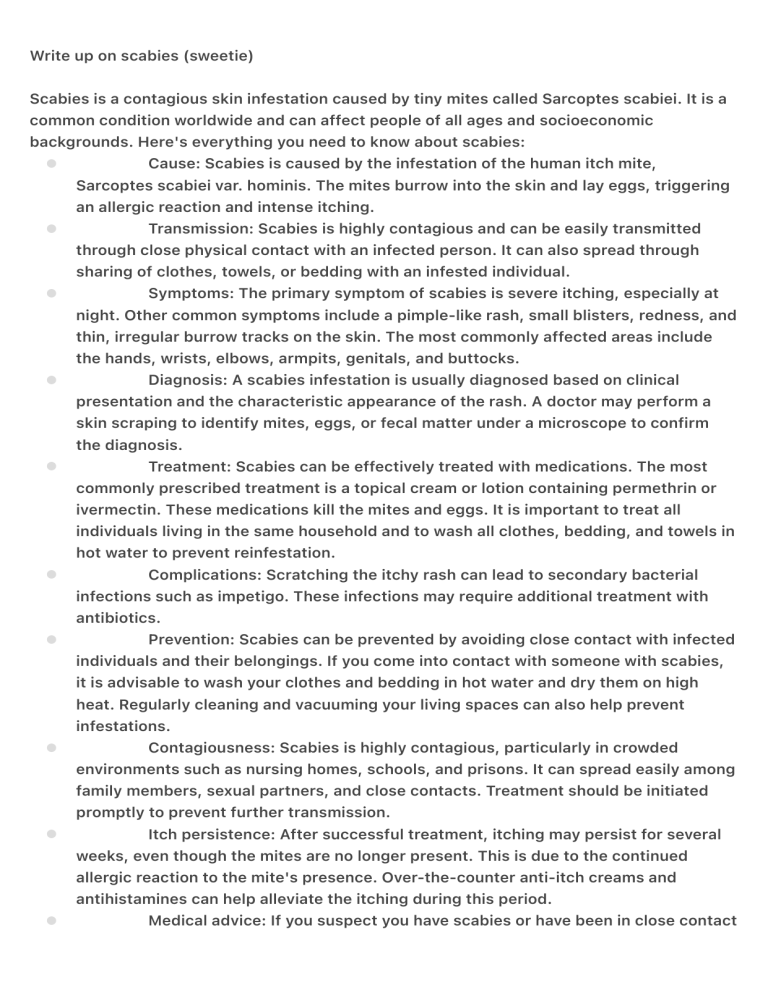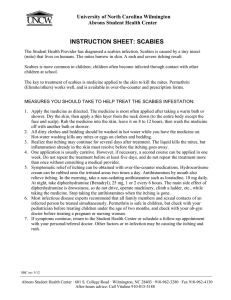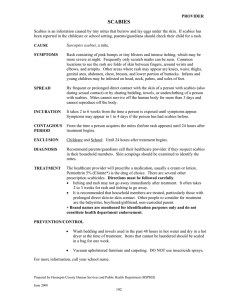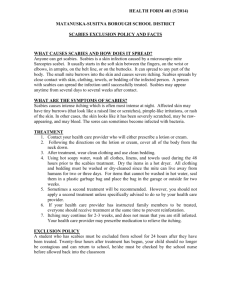
Write up on scabies (sweetie) Scabies is a contagious skin infestation caused by tiny mites called Sarcoptes scabiei. It is a common condition worldwide and can affect people of all ages and socioeconomic backgrounds. Here's everything you need to know about scabies: ● Cause: Scabies is caused by the infestation of the human itch mite, Sarcoptes scabiei var. hominis. The mites burrow into the skin and lay eggs, triggering an allergic reaction and intense itching. ● Transmission: Scabies is highly contagious and can be easily transmitted through close physical contact with an infected person. It can also spread through sharing of clothes, towels, or bedding with an infested individual. ● Symptoms: The primary symptom of scabies is severe itching, especially at night. Other common symptoms include a pimple-like rash, small blisters, redness, and thin, irregular burrow tracks on the skin. The most commonly affected areas include the hands, wrists, elbows, armpits, genitals, and buttocks. ● Diagnosis: A scabies infestation is usually diagnosed based on clinical presentation and the characteristic appearance of the rash. A doctor may perform a skin scraping to identify mites, eggs, or fecal matter under a microscope to confirm the diagnosis. ● Treatment: Scabies can be effectively treated with medications. The most commonly prescribed treatment is a topical cream or lotion containing permethrin or ivermectin. These medications kill the mites and eggs. It is important to treat all individuals living in the same household and to wash all clothes, bedding, and towels in hot water to prevent reinfestation. ● Complications: Scratching the itchy rash can lead to secondary bacterial infections such as impetigo. These infections may require additional treatment with antibiotics. ● Prevention: Scabies can be prevented by avoiding close contact with infected individuals and their belongings. If you come into contact with someone with scabies, it is advisable to wash your clothes and bedding in hot water and dry them on high heat. Regularly cleaning and vacuuming your living spaces can also help prevent infestations. ● Contagiousness: Scabies is highly contagious, particularly in crowded environments such as nursing homes, schools, and prisons. It can spread easily among family members, sexual partners, and close contacts. Treatment should be initiated promptly to prevent further transmission. ● Itch persistence: After successful treatment, itching may persist for several weeks, even though the mites are no longer present. This is due to the continued allergic reaction to the mite's presence. Over-the-counter anti-itch creams and antihistamines can help alleviate the itching during this period. ● Medical advice: If you suspect you have scabies or have been in close contact ● with an infested individual, it is recommended to consult a healthcare professional for a proper diagnosis and treatment plan tailored to your situation. NOTE 2 ● effective treatment for scabies… ● Permethrin cream. Permethrin is a skin cream with chemicals that kill mites that cause scabies and their eggs. It's generally considered safe for adults, people who are pregnant or breastfeeding, and children over 2 months old. ● Sulfur cream. Sulfur cream is a scabies treatment that can be applied overnight, rinsed off and then reapplied for five nights in a row. Sulfur is safe to use in pregnancy and in children under 2 months old. ● Ivermectin (Stromectol). Ivermectin can be taken as a pill to treat scabies when prescription lotions don't work. It's often prescribed for people with crusted scabies or lowered immune systems. Ivermectin isn't recommended for people who are pregnant or nursing, or for children who weigh less than 33 pounds (15 kilograms). ● Benzyl benzoate is also a know prescription for scabies it’s dosage is similar to the permethrin cream it’s only difference is that it can be applied just once. For the ithching it adviced you use an anti itch medication. Although these drugs kill the mites quickly, itching may not stop for many weeks. NB:to avoid reinfestation it’s adviced you wash all your clothings and bedding in hot water to disinfect the materials,or just disinfect them anyway you seem fit. Answered questions on scabbies And yes scabies can be termed as a sexually transmitted disease but it can’t only be transmitted sexually, and can last for months if not treated. Exercpts from open ai and google.






